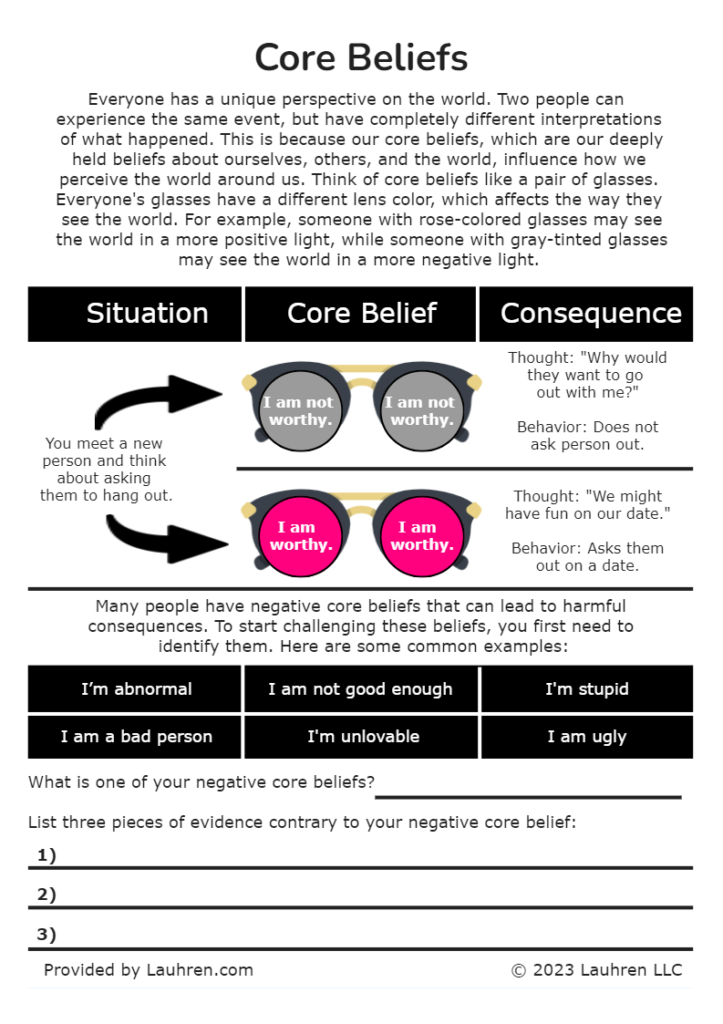Core Beliefs Worksheet
Understanding our core beliefs is crucial to self-awareness and personal growth. A Core Beliefs Worksheet is a practical tool that can help us identify and challenge our core beliefs, paving the way for positive change.
What are Core Beliefs?
Core beliefs are the very essence of how we see ourselves, other people, the world, and the future. Sometimes, these beliefs are positive and beneficial, but at other times, they can be negative and harmful, leading to emotional distress.
The Importance of a Core Beliefs Worksheet
This worksheet is an effective tool used in cognitive behavioral therapy (CBT) because it helps individuals understand their deep-seated beliefs and values. It allows us to dissect our beliefs, understand where they come from, and how they influence our actions.
How to Use a Core Beliefs Worksheet
Using a Core Beliefs Worksheet involves several steps:
- Identify Your Beliefs: Write down any belief that comes to your mind, especially those that seem to dominate your thoughts and influence your actions.
- Challenge Your Beliefs: Ask yourself if your beliefs are rational, if they’re based on facts or just assumptions, and if they’re helping or hindering you.
- Replace Negative Beliefs: If a belief is irrational or harmful, replace it with a positive and beneficial one.
Examples of Core Beliefs
To further understand core beliefs, let’s delve into some common examples. Core beliefs can be broadly categorized into positive and negative.
Positive:
Positive core beliefs are those that contribute to our overall well-being and help us navigate life’s challenges. They include beliefs such as:
- Self-Efficacy: The belief in one’s ability to accomplish tasks and reach goals.
- Optimism: The belief that good things will happen in the future.
- Resilience: The belief in one’s ability to bounce back from adversity.
Negative:
Negative core beliefs, on the other hand, can hinder our growth and happiness. They often stem from traumatic experiences or negative feedback and can include beliefs such as:
- Helplessness: The belief that one is powerless to change their circumstances.
- Worthlessness: The belief that one is not valuable or worthy of love and respect.
- Fear of Failure: The belief that making mistakes is unacceptable and that failure is a reflection of one’s worth.
By using a Core Beliefs Worksheet, we can identify whether our core beliefs are positive and helpful or negative and harmful. This awareness is the first step towards changing negative beliefs and fostering positive ones. Remember, it’s not the events in our life, but our beliefs about them that shape our reality.
In conclusion, one of the most effective ways to improve your mental health and well-being is to identify and challenge your core beliefs. Core beliefs are the deep-seated assumptions you have about yourself, others and the world that shape your thoughts, feelings and behaviors. They are often formed in childhood and can be influenced by your experiences, culture, education and relationships.
However, not all core beliefs are accurate or helpful. Some of them may be negative, distorted or limiting, such as “I’m not good enough”, “People can’t be trusted” or “Life is unfair”. These core beliefs can cause you to suffer from low self-esteem, anxiety, depression or other emotional problems.
That’s why it’s important to use a core beliefs worksheet to help you uncover and change your core beliefs. A core beliefs worksheet is a tool that helps you to identify your core beliefs, examine the evidence for and against them, and replace them with more realistic and positive ones. By doing this, you can enhance your self-confidence, resilience and happiness.
Remember, changing core beliefs takes time and practice, but with persistence and patience, it’s an endeavor that can reap significant rewards.
Note: Always seek professional help when dealing with mental health issues. A worksheet is a tool and not a substitute for professional advice.
